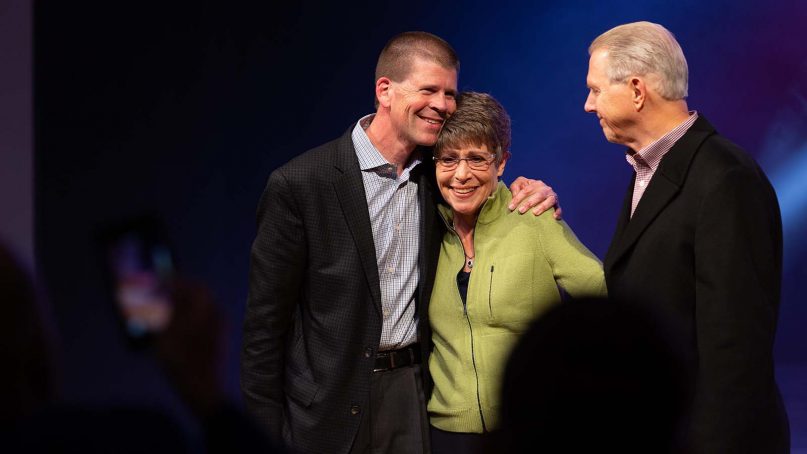
A Christian university in Oklahoma is renaming its main auditorium — known for a half-century as Hardeman Auditorium — amid concerns over a racist statement attributed to the late namesake, N.B. Hardeman.
The president of Oklahoma Christian University, which is associated with Churches of Christ, recently revealed to students that the assembly hall’s new name will honor donors Benton and Paula Baugh.
The Baughs are members of the Memorial Church of Christ in Houston and active proponents of racial unity efforts in Texas’ largest city. They recently gave Oklahoma Christian $1 million — just their latest donation after previous seven-figure support of the university’s Bible and engineering programs.
Students greeted President John deSteiguer’s announcement of the newly renamed Baugh Auditorium — already dubbed the “Baughditorium” — with a standing ovation.

Oklahoma Christian University President John deSteiguer reveals that the school assembly hall’s new name will honor donors Benton and Paula Baugh at the former Hardeman Auditorium in Oklahoma City on Feb. 26, 2019. Photo courtesy of Hayley Bentley, Oklahoma Christian University
“For a lot of African-American students, we’re happy that the name is changing,” said Elise Miller, a sophomore from Plano, Texas. “It’s difficult to worship under the context of a man who, if you met him, probably wouldn’t like you.”
In 1966, Oklahoma Christian dedicated the 1,175-seat auditorium in memory of the late N.B. Hardeman, whom the university’s website called “a great preacher among churches of Christ in the early part of the 20th century and a longtime president of Freed-Hardeman College.”
But recently, some students, faculty members and alumni raised questions about whether Hardeman was a racist.
“As I learned more and more about the levels of concern that people had, I thought: Hospitality and welcoming people are such important core values of this institution that we probably needed to make a change,” deSteiguer said.
Minority and international students comprise roughly one-third of Oklahoma Christian’s total enrollment of nearly 2,300.
In an article titled “Negro Meetings for White People” in the March 1941 edition of the Bible Banner, prominent Church of Christ preacher Foy Wallace wrote that Hardeman refused to meet with African-American Christians and made derogatory comments about them while speaking in Texas.
“When N. B. Hardeman held the valley-wide meeting at Harlingen, Texas, some misguided brethren brought a group of negroes up to the front to be introduced to and shake hands with him,” Wallace wrote. “Brother Hardeman told them publicly that he could see all of the colored brethren he cared to see on the outside after services, and that he could say everything to them that he wanted to say without the formality of shaking hands. I think he was right. He told of a prominent brother in the church who went wild over the negroes and showed them such social courtesies that one day one of the negroes asked him if he might marry his daughter. That gave the brother a jolt and he changed his attitude!”
Douglas A. Foster, director of the Center for Restoration Studies at Abilene Christian University in Texas, said the statement attributed to Hardeman was “typical of the overtly racist attitudes of the day, including the reference to black men as sexual predators and the specter of miscegenation.”
“Hardeman, like virtually all the white leaders of our churches and schools, bought wholly into white supremacist ideology, and it was manifested throughout all his dealings with people,” Foster said.
Oklahoma Christian officials quietly removed the Hardeman name from the auditorium over the Christmas break, a fact first reported by the student newspaper The Talon in late January.
Click here to read more.
Source: Religion News Service